Ministerial Briefing Note: National Gambling Industry Registration
VerifiedAdded on 2022/10/02
|6
|1547
|21
Report
AI Summary
This report is a ministerial briefing note prepared by a policy analyst, addressing the Minister for Health regarding the national registration of the gambling industry. The report highlights the increasing advertisement of gambling on prime television and its implications, drawing attention to the difficulties in controlling unlicensed gambling industries. It provides background information, including the role of the UK Gambling Commission and relevant legislation like the Gambling Act of 2005. The report identifies key issues, such as the importance of advertising for consumer education versus the need for state protection, and analyzes policy options including centrally ordered registration, hefty fines, advertising cost, and advertisement timing. The analyst recommends maintaining the status quo of registration, banning multiple gambling advertising products before 9 pm, imposing hefty fines on unregistered industries, increasing taxes for foreign gambling industries, and raising withholding taxes. The report concludes with references to relevant sources and aims to inform the minister's decision-making process.
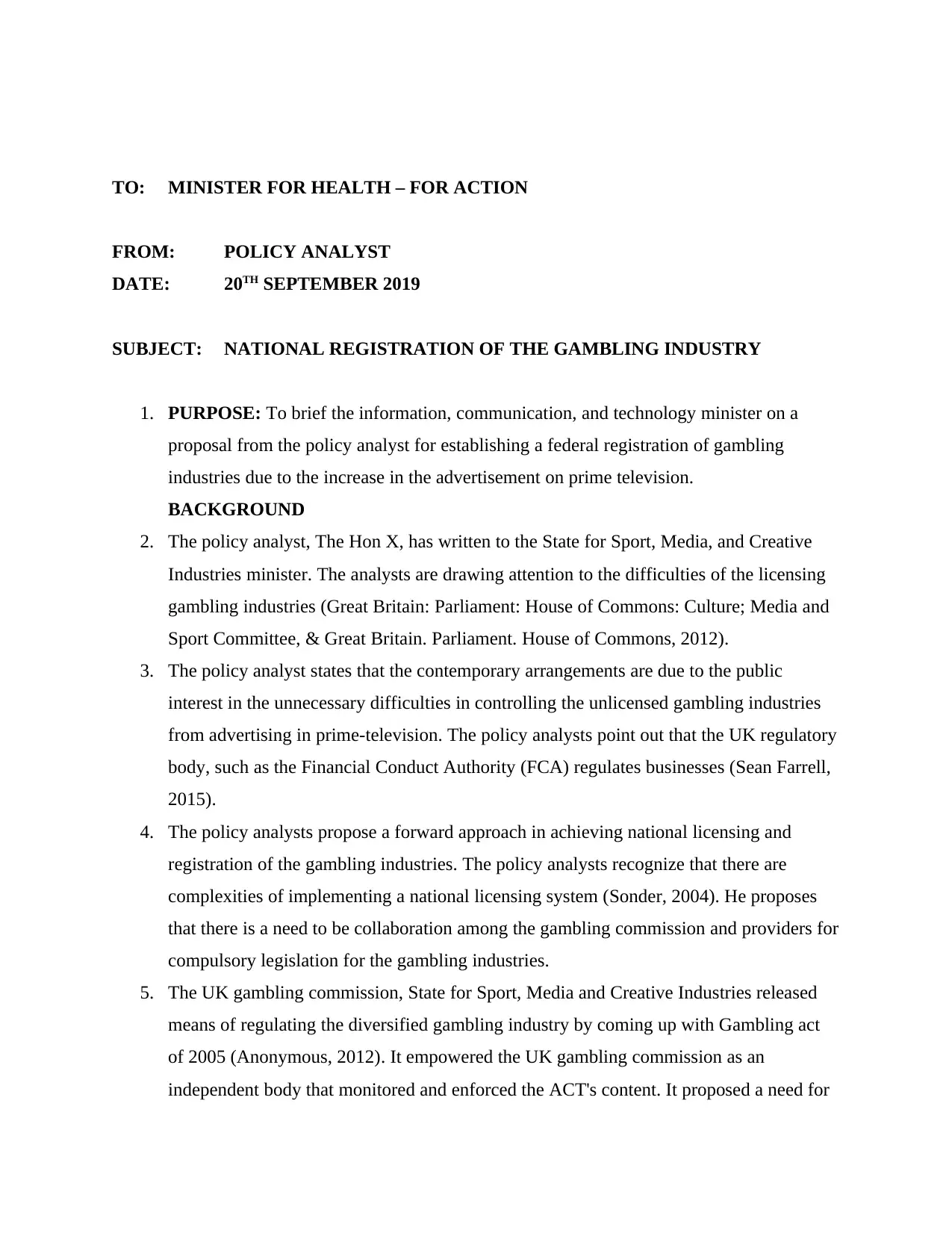
TO: MINISTER FOR HEALTH – FOR ACTION
FROM: POLICY ANALYST
DATE: 20TH SEPTEMBER 2019
SUBJECT: NATIONAL REGISTRATION OF THE GAMBLING INDUSTRY
1. PURPOSE: To brief the information, communication, and technology minister on a
proposal from the policy analyst for establishing a federal registration of gambling
industries due to the increase in the advertisement on prime television.
BACKGROUND
2. The policy analyst, The Hon X, has written to the State for Sport, Media, and Creative
Industries minister. The analysts are drawing attention to the difficulties of the licensing
gambling industries (Great Britain: Parliament: House of Commons: Culture; Media and
Sport Committee, & Great Britain. Parliament. House of Commons, 2012).
3. The policy analyst states that the contemporary arrangements are due to the public
interest in the unnecessary difficulties in controlling the unlicensed gambling industries
from advertising in prime-television. The policy analysts point out that the UK regulatory
body, such as the Financial Conduct Authority (FCA) regulates businesses (Sean Farrell,
2015).
4. The policy analysts propose a forward approach in achieving national licensing and
registration of the gambling industries. The policy analysts recognize that there are
complexities of implementing a national licensing system (Sonder, 2004). He proposes
that there is a need to be collaboration among the gambling commission and providers for
compulsory legislation for the gambling industries.
5. The UK gambling commission, State for Sport, Media and Creative Industries released
means of regulating the diversified gambling industry by coming up with Gambling act
of 2005 (Anonymous, 2012). It empowered the UK gambling commission as an
independent body that monitored and enforced the ACT's content. It proposed a need for
FROM: POLICY ANALYST
DATE: 20TH SEPTEMBER 2019
SUBJECT: NATIONAL REGISTRATION OF THE GAMBLING INDUSTRY
1. PURPOSE: To brief the information, communication, and technology minister on a
proposal from the policy analyst for establishing a federal registration of gambling
industries due to the increase in the advertisement on prime television.
BACKGROUND
2. The policy analyst, The Hon X, has written to the State for Sport, Media, and Creative
Industries minister. The analysts are drawing attention to the difficulties of the licensing
gambling industries (Great Britain: Parliament: House of Commons: Culture; Media and
Sport Committee, & Great Britain. Parliament. House of Commons, 2012).
3. The policy analyst states that the contemporary arrangements are due to the public
interest in the unnecessary difficulties in controlling the unlicensed gambling industries
from advertising in prime-television. The policy analysts point out that the UK regulatory
body, such as the Financial Conduct Authority (FCA) regulates businesses (Sean Farrell,
2015).
4. The policy analysts propose a forward approach in achieving national licensing and
registration of the gambling industries. The policy analysts recognize that there are
complexities of implementing a national licensing system (Sonder, 2004). He proposes
that there is a need to be collaboration among the gambling commission and providers for
compulsory legislation for the gambling industries.
5. The UK gambling commission, State for Sport, Media and Creative Industries released
means of regulating the diversified gambling industry by coming up with Gambling act
of 2005 (Anonymous, 2012). It empowered the UK gambling commission as an
independent body that monitored and enforced the ACT's content. It proposed a need for
Paraphrase This Document
Need a fresh take? Get an instant paraphrase of this document with our AI Paraphraser
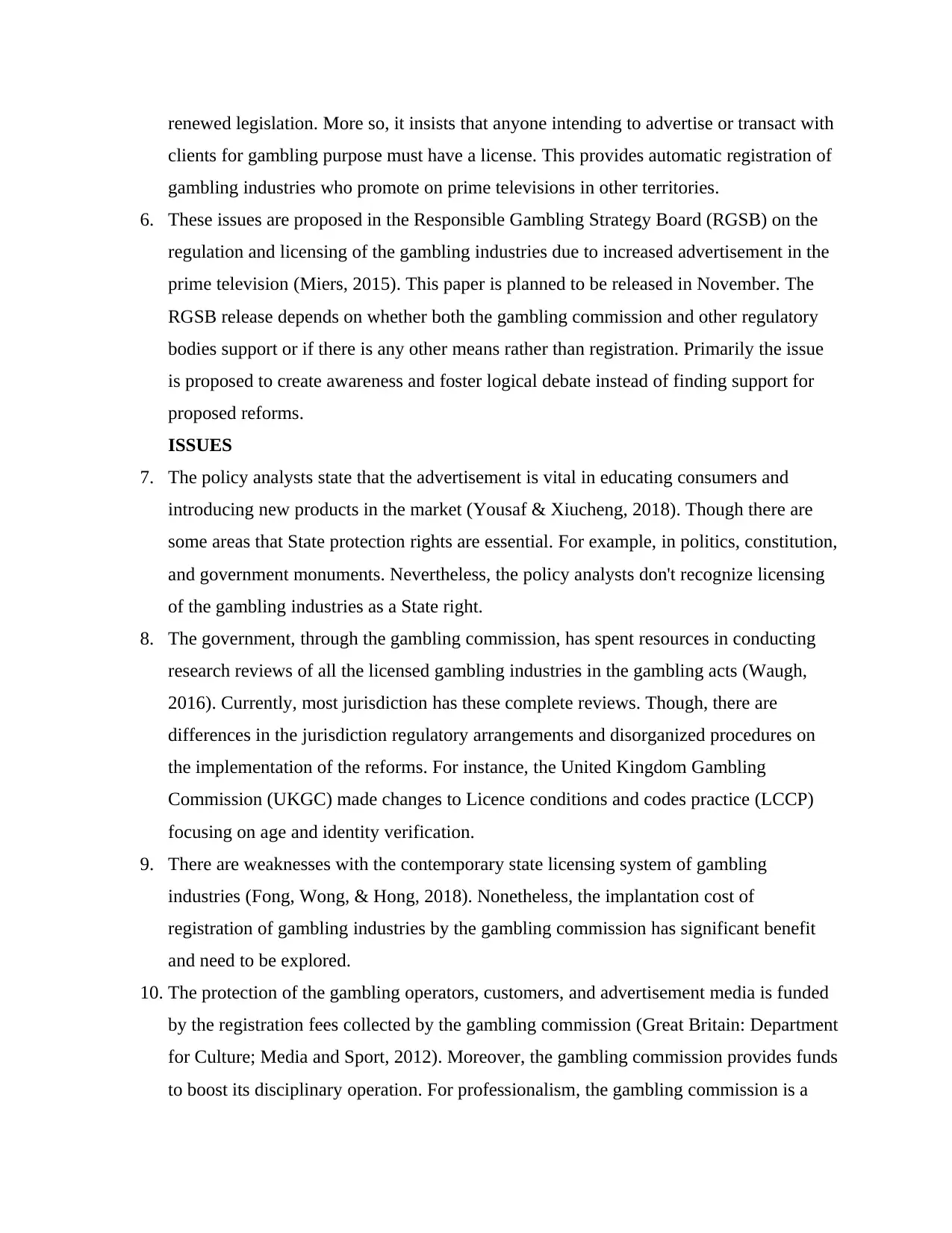
renewed legislation. More so, it insists that anyone intending to advertise or transact with
clients for gambling purpose must have a license. This provides automatic registration of
gambling industries who promote on prime televisions in other territories.
6. These issues are proposed in the Responsible Gambling Strategy Board (RGSB) on the
regulation and licensing of the gambling industries due to increased advertisement in the
prime television (Miers, 2015). This paper is planned to be released in November. The
RGSB release depends on whether both the gambling commission and other regulatory
bodies support or if there is any other means rather than registration. Primarily the issue
is proposed to create awareness and foster logical debate instead of finding support for
proposed reforms.
ISSUES
7. The policy analysts state that the advertisement is vital in educating consumers and
introducing new products in the market (Yousaf & Xiucheng, 2018). Though there are
some areas that State protection rights are essential. For example, in politics, constitution,
and government monuments. Nevertheless, the policy analysts don't recognize licensing
of the gambling industries as a State right.
8. The government, through the gambling commission, has spent resources in conducting
research reviews of all the licensed gambling industries in the gambling acts (Waugh,
2016). Currently, most jurisdiction has these complete reviews. Though, there are
differences in the jurisdiction regulatory arrangements and disorganized procedures on
the implementation of the reforms. For instance, the United Kingdom Gambling
Commission (UKGC) made changes to Licence conditions and codes practice (LCCP)
focusing on age and identity verification.
9. There are weaknesses with the contemporary state licensing system of gambling
industries (Fong, Wong, & Hong, 2018). Nonetheless, the implantation cost of
registration of gambling industries by the gambling commission has significant benefit
and need to be explored.
10. The protection of the gambling operators, customers, and advertisement media is funded
by the registration fees collected by the gambling commission (Great Britain: Department
for Culture; Media and Sport, 2012). Moreover, the gambling commission provides funds
to boost its disciplinary operation. For professionalism, the gambling commission is a
clients for gambling purpose must have a license. This provides automatic registration of
gambling industries who promote on prime televisions in other territories.
6. These issues are proposed in the Responsible Gambling Strategy Board (RGSB) on the
regulation and licensing of the gambling industries due to increased advertisement in the
prime television (Miers, 2015). This paper is planned to be released in November. The
RGSB release depends on whether both the gambling commission and other regulatory
bodies support or if there is any other means rather than registration. Primarily the issue
is proposed to create awareness and foster logical debate instead of finding support for
proposed reforms.
ISSUES
7. The policy analysts state that the advertisement is vital in educating consumers and
introducing new products in the market (Yousaf & Xiucheng, 2018). Though there are
some areas that State protection rights are essential. For example, in politics, constitution,
and government monuments. Nevertheless, the policy analysts don't recognize licensing
of the gambling industries as a State right.
8. The government, through the gambling commission, has spent resources in conducting
research reviews of all the licensed gambling industries in the gambling acts (Waugh,
2016). Currently, most jurisdiction has these complete reviews. Though, there are
differences in the jurisdiction regulatory arrangements and disorganized procedures on
the implementation of the reforms. For instance, the United Kingdom Gambling
Commission (UKGC) made changes to Licence conditions and codes practice (LCCP)
focusing on age and identity verification.
9. There are weaknesses with the contemporary state licensing system of gambling
industries (Fong, Wong, & Hong, 2018). Nonetheless, the implantation cost of
registration of gambling industries by the gambling commission has significant benefit
and need to be explored.
10. The protection of the gambling operators, customers, and advertisement media is funded
by the registration fees collected by the gambling commission (Great Britain: Department
for Culture; Media and Sport, 2012). Moreover, the gambling commission provides funds
to boost its disciplinary operation. For professionalism, the gambling commission is a
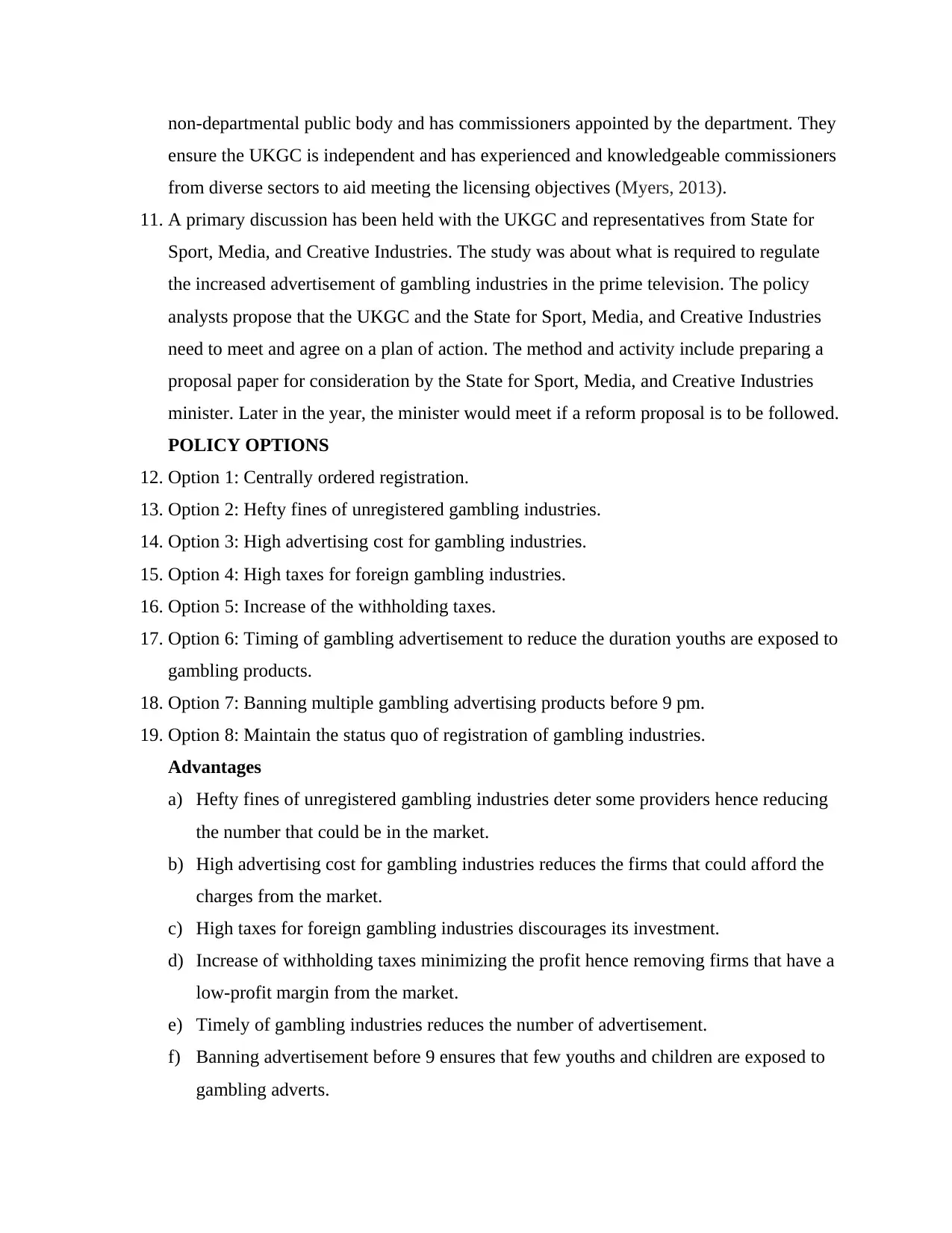
non-departmental public body and has commissioners appointed by the department. They
ensure the UKGC is independent and has experienced and knowledgeable commissioners
from diverse sectors to aid meeting the licensing objectives (Myers, 2013).
11. A primary discussion has been held with the UKGC and representatives from State for
Sport, Media, and Creative Industries. The study was about what is required to regulate
the increased advertisement of gambling industries in the prime television. The policy
analysts propose that the UKGC and the State for Sport, Media, and Creative Industries
need to meet and agree on a plan of action. The method and activity include preparing a
proposal paper for consideration by the State for Sport, Media, and Creative Industries
minister. Later in the year, the minister would meet if a reform proposal is to be followed.
POLICY OPTIONS
12. Option 1: Centrally ordered registration.
13. Option 2: Hefty fines of unregistered gambling industries.
14. Option 3: High advertising cost for gambling industries.
15. Option 4: High taxes for foreign gambling industries.
16. Option 5: Increase of the withholding taxes.
17. Option 6: Timing of gambling advertisement to reduce the duration youths are exposed to
gambling products.
18. Option 7: Banning multiple gambling advertising products before 9 pm.
19. Option 8: Maintain the status quo of registration of gambling industries.
Advantages
a) Hefty fines of unregistered gambling industries deter some providers hence reducing
the number that could be in the market.
b) High advertising cost for gambling industries reduces the firms that could afford the
charges from the market.
c) High taxes for foreign gambling industries discourages its investment.
d) Increase of withholding taxes minimizing the profit hence removing firms that have a
low-profit margin from the market.
e) Timely of gambling industries reduces the number of advertisement.
f) Banning advertisement before 9 ensures that few youths and children are exposed to
gambling adverts.
ensure the UKGC is independent and has experienced and knowledgeable commissioners
from diverse sectors to aid meeting the licensing objectives (Myers, 2013).
11. A primary discussion has been held with the UKGC and representatives from State for
Sport, Media, and Creative Industries. The study was about what is required to regulate
the increased advertisement of gambling industries in the prime television. The policy
analysts propose that the UKGC and the State for Sport, Media, and Creative Industries
need to meet and agree on a plan of action. The method and activity include preparing a
proposal paper for consideration by the State for Sport, Media, and Creative Industries
minister. Later in the year, the minister would meet if a reform proposal is to be followed.
POLICY OPTIONS
12. Option 1: Centrally ordered registration.
13. Option 2: Hefty fines of unregistered gambling industries.
14. Option 3: High advertising cost for gambling industries.
15. Option 4: High taxes for foreign gambling industries.
16. Option 5: Increase of the withholding taxes.
17. Option 6: Timing of gambling advertisement to reduce the duration youths are exposed to
gambling products.
18. Option 7: Banning multiple gambling advertising products before 9 pm.
19. Option 8: Maintain the status quo of registration of gambling industries.
Advantages
a) Hefty fines of unregistered gambling industries deter some providers hence reducing
the number that could be in the market.
b) High advertising cost for gambling industries reduces the firms that could afford the
charges from the market.
c) High taxes for foreign gambling industries discourages its investment.
d) Increase of withholding taxes minimizing the profit hence removing firms that have a
low-profit margin from the market.
e) Timely of gambling industries reduces the number of advertisement.
f) Banning advertisement before 9 ensures that few youths and children are exposed to
gambling adverts.
⊘ This is a preview!⊘
Do you want full access?
Subscribe today to unlock all pages.

Trusted by 1+ million students worldwide
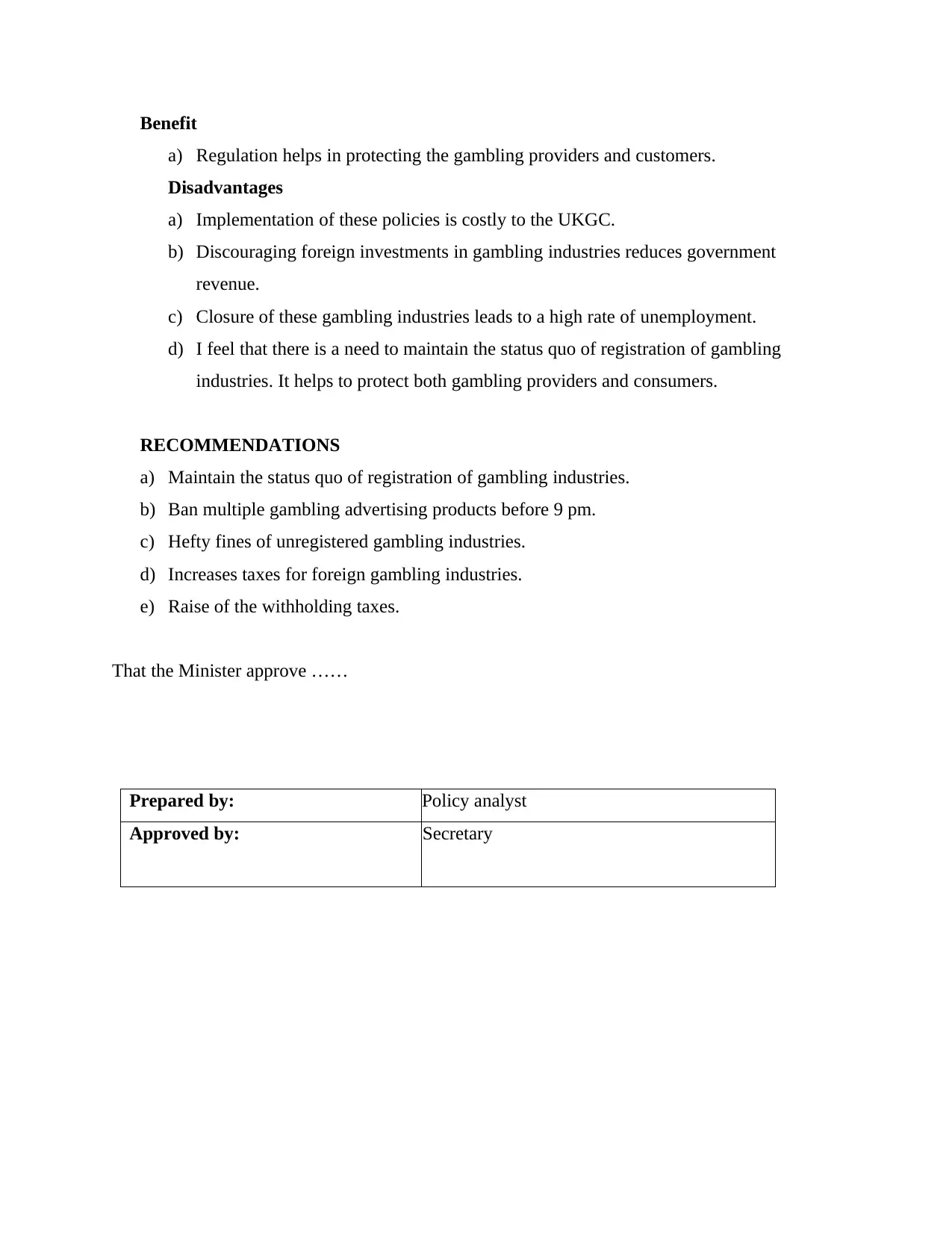
Benefit
a) Regulation helps in protecting the gambling providers and customers.
Disadvantages
a) Implementation of these policies is costly to the UKGC.
b) Discouraging foreign investments in gambling industries reduces government
revenue.
c) Closure of these gambling industries leads to a high rate of unemployment.
d) I feel that there is a need to maintain the status quo of registration of gambling
industries. It helps to protect both gambling providers and consumers.
RECOMMENDATIONS
a) Maintain the status quo of registration of gambling industries.
b) Ban multiple gambling advertising products before 9 pm.
c) Hefty fines of unregistered gambling industries.
d) Increases taxes for foreign gambling industries.
e) Raise of the withholding taxes.
That the Minister approve ……
Prepared by: Policy analyst
Approved by: Secretary
a) Regulation helps in protecting the gambling providers and customers.
Disadvantages
a) Implementation of these policies is costly to the UKGC.
b) Discouraging foreign investments in gambling industries reduces government
revenue.
c) Closure of these gambling industries leads to a high rate of unemployment.
d) I feel that there is a need to maintain the status quo of registration of gambling
industries. It helps to protect both gambling providers and consumers.
RECOMMENDATIONS
a) Maintain the status quo of registration of gambling industries.
b) Ban multiple gambling advertising products before 9 pm.
c) Hefty fines of unregistered gambling industries.
d) Increases taxes for foreign gambling industries.
e) Raise of the withholding taxes.
That the Minister approve ……
Prepared by: Policy analyst
Approved by: Secretary
Paraphrase This Document
Need a fresh take? Get an instant paraphrase of this document with our AI Paraphraser
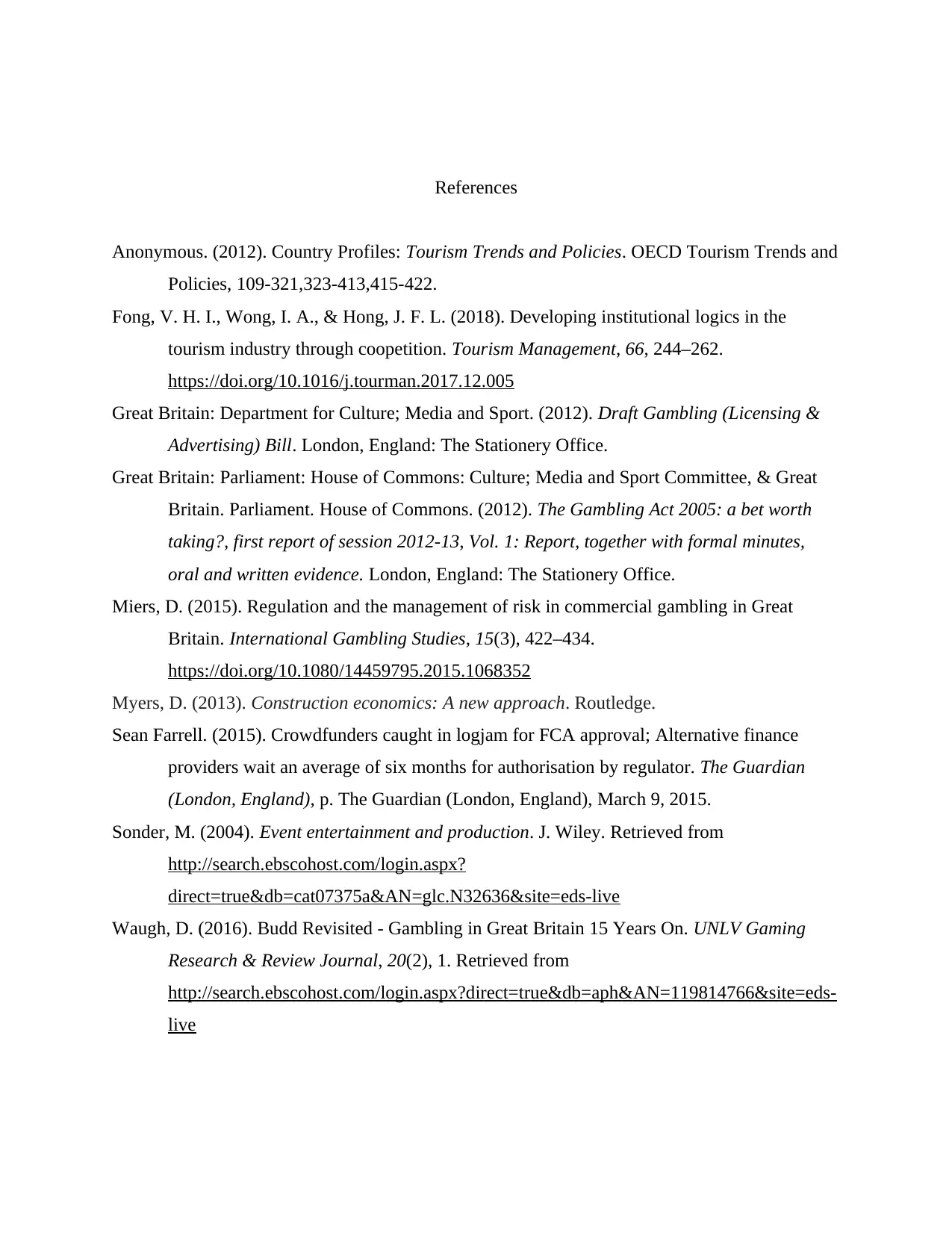
References
Anonymous. (2012). Country Profiles: Tourism Trends and Policies. OECD Tourism Trends and
Policies, 109-321,323-413,415-422.
Fong, V. H. I., Wong, I. A., & Hong, J. F. L. (2018). Developing institutional logics in the
tourism industry through coopetition. Tourism Management, 66, 244–262.
https://doi.org/10.1016/j.tourman.2017.12.005
Great Britain: Department for Culture; Media and Sport. (2012). Draft Gambling (Licensing &
Advertising) Bill. London, England: The Stationery Office.
Great Britain: Parliament: House of Commons: Culture; Media and Sport Committee, & Great
Britain. Parliament. House of Commons. (2012). The Gambling Act 2005: a bet worth
taking?, first report of session 2012-13, Vol. 1: Report, together with formal minutes,
oral and written evidence. London, England: The Stationery Office.
Miers, D. (2015). Regulation and the management of risk in commercial gambling in Great
Britain. International Gambling Studies, 15(3), 422–434.
https://doi.org/10.1080/14459795.2015.1068352
Myers, D. (2013). Construction economics: A new approach. Routledge.
Sean Farrell. (2015). Crowdfunders caught in logjam for FCA approval; Alternative finance
providers wait an average of six months for authorisation by regulator. The Guardian
(London, England), p. The Guardian (London, England), March 9, 2015.
Sonder, M. (2004). Event entertainment and production. J. Wiley. Retrieved from
http://search.ebscohost.com/login.aspx?
direct=true&db=cat07375a&AN=glc.N32636&site=eds-live
Waugh, D. (2016). Budd Revisited - Gambling in Great Britain 15 Years On. UNLV Gaming
Research & Review Journal, 20(2), 1. Retrieved from
http://search.ebscohost.com/login.aspx?direct=true&db=aph&AN=119814766&site=eds-
live
Anonymous. (2012). Country Profiles: Tourism Trends and Policies. OECD Tourism Trends and
Policies, 109-321,323-413,415-422.
Fong, V. H. I., Wong, I. A., & Hong, J. F. L. (2018). Developing institutional logics in the
tourism industry through coopetition. Tourism Management, 66, 244–262.
https://doi.org/10.1016/j.tourman.2017.12.005
Great Britain: Department for Culture; Media and Sport. (2012). Draft Gambling (Licensing &
Advertising) Bill. London, England: The Stationery Office.
Great Britain: Parliament: House of Commons: Culture; Media and Sport Committee, & Great
Britain. Parliament. House of Commons. (2012). The Gambling Act 2005: a bet worth
taking?, first report of session 2012-13, Vol. 1: Report, together with formal minutes,
oral and written evidence. London, England: The Stationery Office.
Miers, D. (2015). Regulation and the management of risk in commercial gambling in Great
Britain. International Gambling Studies, 15(3), 422–434.
https://doi.org/10.1080/14459795.2015.1068352
Myers, D. (2013). Construction economics: A new approach. Routledge.
Sean Farrell. (2015). Crowdfunders caught in logjam for FCA approval; Alternative finance
providers wait an average of six months for authorisation by regulator. The Guardian
(London, England), p. The Guardian (London, England), March 9, 2015.
Sonder, M. (2004). Event entertainment and production. J. Wiley. Retrieved from
http://search.ebscohost.com/login.aspx?
direct=true&db=cat07375a&AN=glc.N32636&site=eds-live
Waugh, D. (2016). Budd Revisited - Gambling in Great Britain 15 Years On. UNLV Gaming
Research & Review Journal, 20(2), 1. Retrieved from
http://search.ebscohost.com/login.aspx?direct=true&db=aph&AN=119814766&site=eds-
live
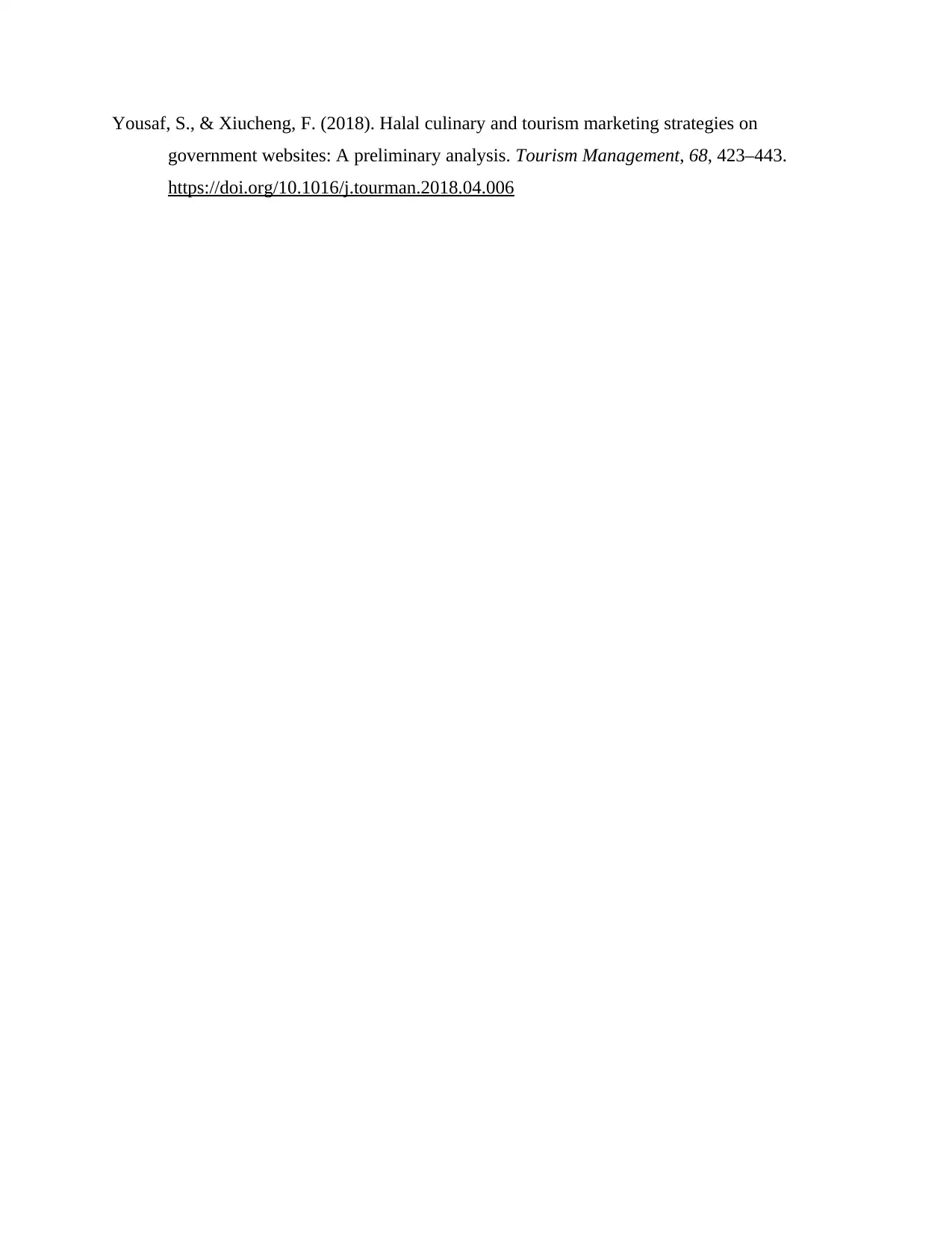
Yousaf, S., & Xiucheng, F. (2018). Halal culinary and tourism marketing strategies on
government websites: A preliminary analysis. Tourism Management, 68, 423–443.
https://doi.org/10.1016/j.tourman.2018.04.006
government websites: A preliminary analysis. Tourism Management, 68, 423–443.
https://doi.org/10.1016/j.tourman.2018.04.006
⊘ This is a preview!⊘
Do you want full access?
Subscribe today to unlock all pages.

Trusted by 1+ million students worldwide
1 out of 6
Your All-in-One AI-Powered Toolkit for Academic Success.
+13062052269
info@desklib.com
Available 24*7 on WhatsApp / Email
![[object Object]](/_next/static/media/star-bottom.7253800d.svg)
Unlock your academic potential
Copyright © 2020–2025 A2Z Services. All Rights Reserved. Developed and managed by ZUCOL.

